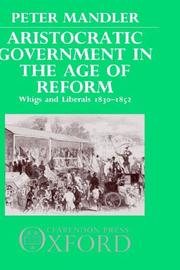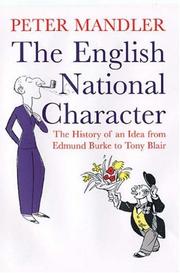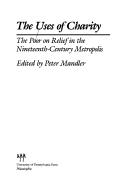| Listing 1 - 10 of 15 | << page >> |
Sort by
|

ISBN: 0198217811 0191678287 Year: 1990 Publisher: Oxford Clarendon
Abstract | Keywords | Export | Availability | Bookmark
 Loading...
Loading...Choose an application
- Reference Manager
- EndNote
- RefWorks (Direct export to RefWorks)
This title challenges the view that there was a smooth and inevitable progression towards liberalism in early 19th-century England. The book examines the argument used by the high Whigs that the landed aristocracy still had a positive contribution to make to the welfare of the people.
Nobility --- Regions & Countries - Europe --- History & Archaeology --- Great Britain --- History --- Politics and government --- Noble class --- Noble families --- Nobles (Social class) --- Peerage --- Upper class --- Aristocracy (Social class) --- Titles of honor and nobility --- Great Britain. --- Liberal Party (Great Britain) --- Whig Party (Great Britain) --- Liberal Party (Gt. Brit.) --- Social and Liberal Democrats (Great Britain) --- 英國. --- England and Wales. --- Reform --- Grande-bretagne --- Politique et gouvernement --- 19e siecle

ISBN: 9780300120523 0300120524 Year: 2006 Publisher: New Haven Yale university press
Abstract | Keywords | Export | Availability | Bookmark
 Loading...
Loading...Choose an application
- Reference Manager
- EndNote
- RefWorks (Direct export to RefWorks)
Group identity --- National characteristics, British --- National characteristics, English --- History. --- History --- English national characteristics --- British national characteristics --- Collective identity --- Community identity --- Cultural identity --- Social identity --- Identity (Psychology) --- Social psychology --- Collective memory --- Great Britain --- Civilization. --- Social life and customs.

ISBN: 0812282140 Year: 1990 Publisher: Philadelphia, Pa University of Pennsylvania Press
Abstract | Keywords | Export | Availability | Bookmark
 Loading...
Loading...Choose an application
- Reference Manager
- EndNote
- RefWorks (Direct export to RefWorks)
History of North America --- History of Europe --- anno 1800-1899 --- New York City --- Charities --- Poor --- Urban poor --- History --- New York City [New York]
Book
ISBN: 129928406X 0300189702 9780300189704 9781299284067 9780300187854 0300187858 Year: 2013 Publisher: New Haven
Abstract | Keywords | Export | Availability | Bookmark
 Loading...
Loading...Choose an application
- Reference Manager
- EndNote
- RefWorks (Direct export to RefWorks)
Celebrated anthropologist Margaret Mead, who studied sex in Samoa and child-rearing in New Guinea in the 1920s and '30s, was determined to show that anthropology could tackle the psychology of the most complex, modern societies in ways useful for waging the Second World War. This fascinating book follows Mead and her closest collaborators-her lover and mentor Ruth Benedict, her third husband Gregory Bateson, and her prospective fourth husband Geoffrey Gorer-through their triumphant climax, when Mead became the cultural ambassador from America to Britain in 1943, to their downfall in the Cold War. Part intellectual biography, part cultural history, and part history of the human sciences, Peter Mandler's book is a reminder that the Second World War and the Cold War were a clash of cultures, not just ideologies, and asks how far intellectuals should involve themselves in politics, at a time when Mead's example is cited for and against experts' involvement in Iraq and Afghanistan.
National characteristics. --- Ethnopsychology. --- World War, 1939-1945 --- Cold War --- Anthropology --- Human beings --- World politics --- Cross-cultural psychology --- Ethnic groups --- Ethnic psychology --- Folk-psychology --- Indigenous peoples --- National psychology --- Psychological anthropology --- Psychology, Cross-cultural --- Psychology, Ethnic --- Psychology, National --- Psychology, Racial --- Race psychology --- Psychology --- National characteristics --- Characteristics, National --- Identity, National --- Images, National --- National identity --- National images --- Nationalism --- Social psychology --- Collective memory --- Ethnopsychology --- Exceptionalism --- Social aspects. --- History --- Mead, Margaret, --- Mid, Margaret, --- Friends and associates. --- Mīd, Mārgārit, --- ميد، مارگارت --- Primitive societies --- Social sciences
Book
Year: 1997 Publisher: New Haven, Conn. ; : Yale University Press,
Abstract | Keywords | Export | Availability | Bookmark
 Loading...
Loading...Choose an application
- Reference Manager
- EndNote
- RefWorks (Direct export to RefWorks)
Book
ISBN: 1134911742 Year: 1994 Publisher: Taylor & Francis
Abstract | Keywords | Export | Availability | Bookmark
 Loading...
Loading...Choose an application
- Reference Manager
- EndNote
- RefWorks (Direct export to RefWorks)
Book
ISBN: 9780198840145 Year: 2020 Publisher: Oxford Oxford University Press
Abstract | Keywords | Export | Availability | Bookmark
 Loading...
Loading...Choose an application
- Reference Manager
- EndNote
- RefWorks (Direct export to RefWorks)
Before the Second World War, only about 20% of the population went to secondary school and barely 2% to university; today everyone goes to secondary school and half of all young people go to university. How did we get here from there? 0The Crisis of the Meritocracy answers this question not by looking to politicians and educational reforms, but to the revolution in attitudes and expectations amongst the post-war British public - the rights guaranteed by the welfare state, the hope of a better life for one's children, widespread upward mobility from manual to non-manual occupations, confidence in the importance of education in a 'learning society' and a 'knowledge economy'. 0As a result of these transformations, 'meritocracy' - the idea that a few should be selected to succeed - has been challenged by democracy and its wider understandings of equal opportunity across the life course. At a time when doubts have arisen about whether we need so many students, and amidst calls for a return to grammar-school selection at 11, the tension between meritocracy and democracy remains vital to understanding why our grandparents, our parents, ourselves and our children have0sought and got more and more education - and to what end.
Book
ISBN: 9781512804102 Year: 2016 Publisher: Philadelphia
Abstract | Keywords | Export | Availability | Bookmark
 Loading...
Loading...Choose an application
- Reference Manager
- EndNote
- RefWorks (Direct export to RefWorks)

ISBN: 9781512804102 9780812282146 Year: 2016 Publisher: Philadelphia, Pa University of Pennsylvania Press
Abstract | Keywords | Export | Availability | Bookmark
 Loading...
Loading...Choose an application
- Reference Manager
- EndNote
- RefWorks (Direct export to RefWorks)
Book
Abstract | Keywords | Export | Availability | Bookmark
 Loading...
Loading...Choose an application
- Reference Manager
- EndNote
- RefWorks (Direct export to RefWorks)
Written by a team of eminent historians, these essays explore how ten twentieth-century intellectuals and social reformers sought to adapt familiar Victorian values to modern conditions of democracy, feminism and mass culture.
| Listing 1 - 10 of 15 | << page >> |
Sort by
|

 Search
Search Feedback
Feedback About UniCat
About UniCat  Help
Help News
News